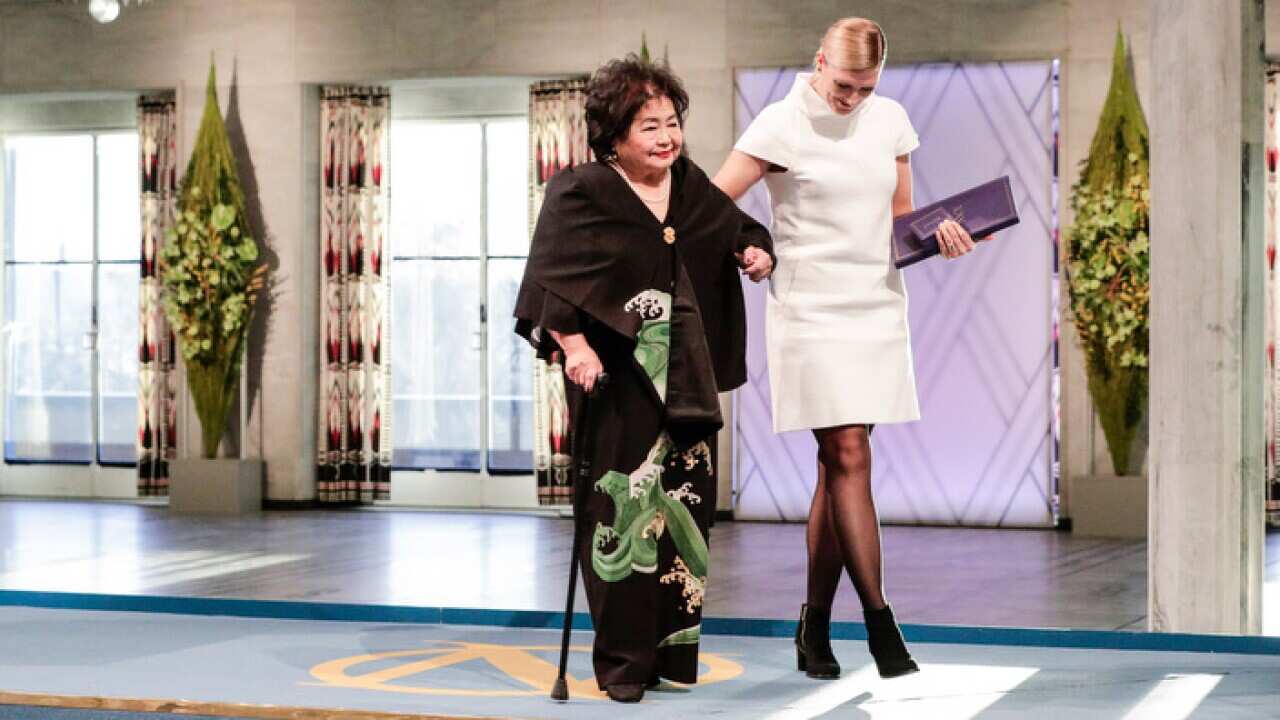Anti-nuclear weapons group ICAN have called on the Australian government to sigh a UN treaty to ban nuclear weapons as they accepted their Nobel Peace Prize.
The Melbourne group is the first Australian-founded organisation to be awarded with the prize.
Starting in the inner-city suburb of Carlton in 2006, the group was officially launched at Victoria's parliament house in 2007.
Since then, it has grown to a coalition of 468 grassroots non-governmental groups working towards a UN Treaty on the prohibition of nuclear weapons.
That goal was achieved when the treaty on the prohibition of nuclear weapons was adopted by 122 nations in July, but Australia was not one of those countries.
The chairman of the Australian board of ICAN, Richard Tanter, said it was an incredible achievement to see an organisation that started in Melbourne have such a global impact.
"They (the founders) worked out that you need to be highly focussed, have one single goal - to abolish nuclear weapons. And then they set out from Australia working out to build a global coalition," he told SBS News.
"I think the award gives immense confidence that people far beyond ICAN, they do have the power to do it.
"The name ICAN was taken for a reason. We are not under any illusions on how easy it is going to be (to achieve a nuclear-free world).
"But I think for many groups this is a chance for them to up their game and start putting pressure on their governments.”
Still waiting to hear from Turnbull: ICAN
Greens party leader Richard Di Natale moved a motion in the Senate in October to congratulate ICAN on winning the nuclear prize.
It was followed by the tabling in the Lower House of a petition signed by more than 50 civil society groups urging Prime Minister Malcolm Turnbull to get Australian to join the UN treaty.
Mr Tanter said it was disappointing the federal government had been notably absent from the number of world leaders, political parties and individuals that offered their congratulations and support.
"While we are still waiting for the prime minister, Malcolm Turnbull, to congratulate us on winning a Nobel Peace Prize, having Australia sign up to the nuclear weapon ban treaty would well and truly make up for this oversight," he said.
Victorian Premier Daniel Andrews joined Greens and Labor MPs in congratulating ICAN on receiving the Nobel Peace Prize.
"We are proud that ICAN opened its first office in Melbourne and even prouder still that this organisation is such an exemplary ambassador for the state of Victoria and the change that ordinary people can make," Mr Andrews said.
"Thanks to ICAN's work and the recognition that a Nobel Peace Prize brings, we can imagine a world free from nuclear weapons."
A false sense of security
Accepting the peace prize in Oslo on Sunday night, ICAN's executive director Beatrice Fihn urged countries with nuclear weapons to sign the UN Treaty.
"It provides a choice. A choice between the two endings - the end of nuclear weapons or the end of us," she told a global audience.
"A moment of panic or carelessness, a misconstrued comment or bruised ego, could easily lead us unavoidably to the destruction of entire cities.
"A calculated military escalation could lead to the indiscriminate mass murder of civilians."
While awarding the prize, Norwegian Nobel Committee chair Berit Reiss-Andersen paid tribute to the ICAN's achievements.
"It is impressive that ICAN is able to unite so many different groups in support of a common goal and give a voice to millions of people who are convinced that nuclear weapons do not provide security, but insecurity," she said.
Australia urged to follow NZ's lead
ICAN founding chair Dr Tilman Ruff said Australia should follow the lead of other countries in the Asia-Pacific region, such as New Zealand and Indonesia, that have recognised the need to sign and ratify the treaty.
"Nuclear weapons pose an existential threat in any hands and the risks of nuclear war are as high now as they have ever been," he said.
Indigenous activist Karina Lester, whose father was blinded by British nuclear testing in South Australia in the 1950s, said the legacy of nuclear testing underlined the importance of a nuclear-free world.
"Our Anangu story is not a happy one," Ms Lester said.
She said it was important to share that story during the UN treaty negotiations in New York earlier this year.
"It was a privilege to speak up at the UN - for my family and my own people and for Indigenous peoples around the world who have suffered the effects of nuclear testing since the dawn of this nuclear age," Ms Lester said.
Mr Tanter said the spectre of the Cold War was stronger than it had ever been.
"I think we're back at a very dangerous time in the world. Many of us who are old enough to remember the Cold War thought that it was all over when the Berlin Wall fell. Nuclear weapons are still with us," he said.
"Every country with nuclear weapons is modernising their arsenal. And more importantly we've seen on the Korean peninsula the rise of the extraordinary threatening rhetoric between North Korea and the United States.
"I think there is a consensus is building around the world that the nuclear weapon states have been dominating this discussion for more 70 years.
"And it is time now for non-nuclear states and civil society group like ICAN to say repeating mantra of deterrence that this will keep peace in the world is quite frankly irrational and immensely dangerous.
"And I think the pressure will build on countries like Australia to sign the treaty and then it will be a matter of pressure on the nuclear states.
"That is going to be a very long time obviously. But I think people are aware if we don't start now, we will be faced with appalling consequences."


